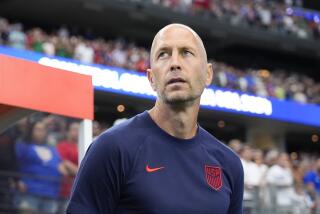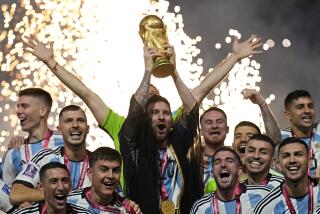World Cup ‘94: 27 Days and Counting : Super Stopper : When Chips Are Down, Goycochea Is Argentina’s Ace in the Goal
- Share via
If not for the bad luck of one Argentine goalkeeper, and the bad attitude of another, it is doubtful the world would ever have heard of Sergio Javier Goycochea.
Nery Pumpido was in the nets in 1986 when Argentina won the World Cup in Mexico. His understudy that year was Luis Islas.
Four years later, when Argentine Coach Carlos Salvador Bilardo chose his three goalkeepers for Italia ‘90, Pumpido was his first choice, Islas his second and Goycochea third.
But Islas refused to play another World Cup as No. 2 and was dropped from the team. That moved Goycochea up a notch. If anything happened to Pumpido, he would become Argentina’s last line of defense.
Pumpido’s luck had never been good. In one bizarre accident, he caught his wedding ring on a hook holding the netting to the crossbar and nearly lost the finger. Luckily, surgeons were able to repair the damage and save his career.
Then, in Argentina’s opening game in the 1990 World Cup, against Cameroon in Milan, Pumpido fumbled a header by striker Francois Omam-Biyik and the ball trickled across the line to give the African team a 1-0 victory and a momentous upset over the defending world champion.
Even before Argentina had made its way down to Naples to play the Soviet Union in its next match, Bilardo was having second thoughts about Pumpido. But he was spared making a decision.
Twelve minutes into the game with the Soviets, Pumpido’s bad luck caught up with him again. He collided with teammate Julio Olarticoechea and suffered a broken leg.
As Pumpido was being carried from the field on a stretcher, Bilardo escorted Goycochea onto the field and into the history books.
For the next four years, Goycochea built a reputation as a goalkeeper of extraordinary ability, one who exhibited a priceless gift for saving penalty kicks.
The nicknames came fast and furious. Goycochea became the “Prince of Penalties” and the “King of the Shootout.” To his teammates, however, he remained simply “Goyco.”
A penalty kick in soccer is virtually an automatic goal. The ball is placed on the penalty spot, 12 yards from the net. The goalkeeper is positioned on his line and is not allowed to move until the ball is struck. About 90% of all penalty kicks result in goals.
But not against Goycochea.
“Saving penalties has very little to do with luck, more to do with intuition,” he said. “A goalkeeper can do one of three things: dive left, dive right or stay in place. Often, you look into the eye of the penalty-taker to try to find a clue. That’s what I do.”
World Cup ’90 in Italy made Goycochea a hero in Argentina and a household name in the rest of the soccer world. The Copa America, or South American Championship, tournaments of 1991 in Chile and 1993 in Ecuador established his place in the history of the game.
It all began in Naples. But it as easily could have ended there, too.
Goycochea had not been on the field for more than a minute against the Soviets when a header by Oleg Kuznetsov caught him out of position. But as misfortune had followed Pumpido, so good luck followed Goycochea.
For whatever improbable reason, Diego Maradona was back on defense, positioned in front of the net. Maradona stuck out a hand and deflected Kuznetsov’s shot. The crowd saw the violation, but Swedish referee Erik Fredricksson missed it. The hand ball went unpunished and all of Argentina breathed again.
The Soviets were beaten, 2-0, and a 1-1 tie against Romania in the final first-round game earned the Argentines a place in the second round. That’s where the Goycochea legend began.
Playing in Turin’s magnificent Stadium of the Alps, Argentina was subjected to wave after wave of Brazilian attacks. Shots flew goalward from all angles. Some went wide, some flew high, some hit the posts or crossbar and some were saved by Goycochea.
Suddenly, a brilliant pass from Maradona produced a goal by Claudio Caniggia and Brazil had been beaten, 1-0. Goycochea had a shutout and Argentina was in the quarterfinals.
Yugoslavia was next. The score was 0-0 after 90 minutes and unchanged after 120. That brought up the best-of-five penalty shootout. Yugoslavia missed its first attempt and Goycochea saved the fourth. Maradona missed for Argentina, which led, 3-2, when Faruhk Hadzibegic stepped up to take Yugoslavia’s last kick.
“I feinted to dive right and threw myself back to the left,” Goycochea said. “He hit the ball well, but not so powerfully. I can’t really remember what happened after that. It’s all a blur. I just started running like a madman. I remember Diego (Maradona) shouting: ‘You’re a genius! A genius!’ Then it was as if the world fell in.”
Hailed as an immediate hero, not only in his native town of Lima, about 60 miles from Buenos Aires, but throughout Argentina, Goycochea proved in the next game that it had not been a fluke.
Playing Italy, the World Cup host, in the semifinal in Naples, Argentina again forced a tie, this time 1-1 after overtime, and the match went to penalty kicks.
The Argentines made their first four. Flinging himself to his left each time, Goycochea produced two splendid saves against Roberto Donadoni and Aldo Serena, and Argentina won the shootout, 4-3, advancing to the final and reducing all of Italy to tears.
But the Argentine dream ended in Rome. A superbly struck penalty kick by Andreas Brehme barely eluded Goycochea’s outstretched fingers and flashed inside the left post. The World Cup was over. West Germany had won, 1-0.
Since then, Goycochea has, if anything, enhanced his reputation. Coming into World Cup ‘94, he has yet to be beaten in a penalty shootout and has saved a remarkable eight penalty kicks for the national team.
Blessed with excellent reflexes and cat-like quickness, he adds to the mix a calmness and confidence that both settles his teammates and unnerves the opposition.
“People started suggesting (in Italia ‘90) that I had studied every player’s penalty technique,” he told London’s World Soccer magazine. “That’s all wrong. I didn’t do any homework at all.
“On a penalty, a goalkeeper has nothing to lose and everything to gain. If he saves, he’s a hero. If the opponent scores, then he’s only doing his duty. If all five shots go past you, it’s no big deal. So I didn’t have any problems with nerves.”
Goycochea made one of his greatest penalty saves in the Copa America tournament in Ecuador last summer. Again, Brazil was the opponent and, again, the Brazilians had run the Argentines ragged in the quarterfinal game in Guayaquil. But Goycochea held Brazil to a single goal and, after Argentina had tied the score late in the second half, the match ended up in penalty kicks.
The outcome was almost a foregone conclusion. Argentina won, 6-5, after Goycochea had denied Boiadeiro with a stunning save that he considers his best to date.
“The most emotional shootout was against Italy (in 1990) because it was a World Cup and it meant we reached the final,” he said.
“But the Brazilian players are the most difficult (to save against), at least on paper. They have the best technique and, with a slight movement, they can change the direction (of the shot).”
Goycochea’s penalty kick heroics against Brazil were followed by another saved penalty in a shootout against Colombia in the Copa America semifinal, and Argentina went on to retain its South American title, beating Mexico in the championship match.
Surprisingly, Goycochea’s success with the national team has not earned him a spot with a large European club, and he has tended to roam about since Italia ’90. He has played for Brest in France and for Cerro Porteno and Olimpia in Paraguay, before returning to home to lead River Plate to its most recent Argentine championship.
Even then, Goycochea’s form has been inconsistent, and he was dropped for one game by River Plate’s 1978 World Cup-winning coach, Daniel Passarella. Goycochea dismissed the incident as irrelevant.
“I’ve suffered worse moments than this in my career, and I’m not going to give in now,” he said, later adding, “it did not bother me in the slightest. It was only for one game. River Plate went on to win the championship.”
Argentina’s humiliating 5-0 loss to Colombia in World Cup qualifying in Buenos Aires last year is similarly discounted by Goycochea.
“It was an accident that can happen to anyone,” he said. “It’s in the past, and now we are looking ahead.”
The future arrives next month in the shape of Nigeria, Greece and Bulgaria, Argentina’s first three World Cup opponents.
But Bilardo is not worried. If it comes to a shootout, the coach believes he has the best weapon.
“I don’t think it is a lottery,” Bilardo said. “It depends on the players you have . . . and the goalkeeper.”
Argentina, he believes, is in safe hands.
Player Profile
* Name: Sergio Javier Goycochea.
* Born: Oct. 17, 1963, Lima, Argentina.
* Nationality: Argentine.
* Position: Goalkeeper.
* Club: River Plate (Argentina).
* National team debut: 1987, vs. Switzerland.
* Caps (international matches): 46
* Little-known fact: When Goycochea made his World Cup debut in 1990, his club was Millonarios of Colombia, but he had not played for five months because the Colombian season was canceled after the murder of a referee.
* Honors: World Cup runner-up in 1990; South American championship (Copa America) winner in 1991 and 1993; South American club championship (Copa Libertadores) winner in 1986. Three-time Argentine League champion with River Plate.
More to Read
Go beyond the scoreboard
Get the latest on L.A.'s teams in the daily Sports Report newsletter.
You may occasionally receive promotional content from the Los Angeles Times.






